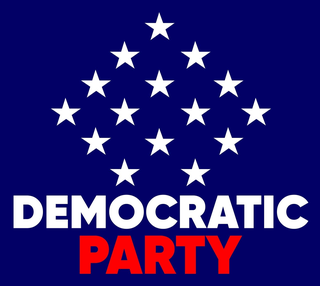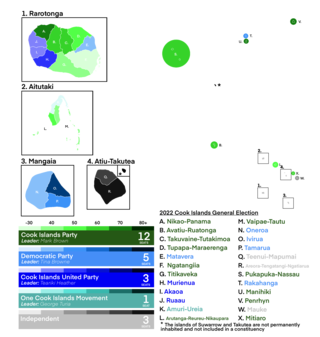
The politics of the Cook Islands takes place in a framework of a parliamentary representative democracy within a constitutional monarchy. The Monarch of New Zealand, represented in the Cook Islands by the King or Queen's Representative, was the Head of State; the prime minister is the head of government of a multi-party system. The nation is self-governing and are fully responsible for internal and foreign affairs. Since 2001, the Cook Islands has run its own foreign and defence policy. Executive power is exercised by the government, while legislative power is vested in both the government and the islands' parliament. The judiciary is independent of the executive and the legislatures.
Robert Woonton is a Cook Islands politician and diplomat. He served as Prime Minister of the Cook Islands from 11 February 2002 until 11 December 2004, and later as High Commissioner to New Zealand. He was a member of the centrist Democratic Party.

Jim Marurai was a Cook Islands politician who served as Prime Minister of the Cook Islands. He was a member of the Democratic Party.

The Democratic Party is a political party in the Cook Islands. As a result of the 2022 Cook Islands election, it is currently in opposition, holding five seats in the Cook Islands Parliament.

The Cook Islands Party is a nationalist political party in the Cook Islands. It was the first political party founded in the Cook Islands, and one of the two major parties of the islands' politics since 1965.
The Cook Islands First Party was a political party in the Cook Islands. The party was originally a faction within the Cook Islands Democratic Party which supported Prime Minister Robert Woonton over Terepai Maoate. The 2004 elections saw the Democrats win a clear majority, but it was not clear whether Woonton would have the numbers within the party to remain Prime Minister. Woonton's announcement on 15 November 2004 that he was forming a coalition with the rival Cook Islands Party with himself as Prime Minister. This touched off a bitter struggle within the Democrats, which ultimately saw Woonton and his Health Minister Peri Vaevae Pare expelled from the party. Woonton responded by launching his own party, the Demo Tumu Party, on 1 December 2004.

General elections were held in the Cook Islands on 27 September 2006 in order to elect 24 MPs to the Cook Islands Parliament. The Democratic Party remained in power, winning 15 of 24 seats. A total of 8,497 voters turned out to vote.

General elections were held in the Cook Islands on 16 June 1999 to elect 25 MPs to the Parliament. The Cook Islands Party won 11 seats, the Democratic Alliance Party 10 seats, and the New Alliance Party 4 seats.
Norman George is a Cook Islands politician and former Speaker of the Cook Islands Parliament, Deputy Prime Minister, and Cabinet Minister.

General elections were held in the Cook Islands in January 1989 to elect 24 MPs to the Parliament. The elections saw the Cook Islands Party win 12 seats, the Democratic Tumu Party win 2 seats, and the Democratic Party-led opposition coalition win 9 seats. One seat was won by an independent. Following the elections, the Democratic Tumu Party supported the CIP, and Geoffrey Henry became Prime Minister for the second time.

General elections were held in the Cook Islands on 2 November 1983. The result was a victory for the Democratic Party, which won 13 of the 24 seats. A coalition government was formed with the opposition Cook Islands Party, with Democratic Party leader Thomas Davis as prime minister and CIP leader Geoffrey Henry as deputy prime minister. Henry was later replaced with Terepai Maoate.

General elections were held in the Cook Islands on 30 March 1978 to elect members of the Legislative Assembly. The result was a victory for the Cook Islands Party (CIP) of Premier Albert Henry, which won 15 of the 22 seats. The Democratic Party won the remaining seven seats.

General elections were held in the Cook Islands on 17 November 2010 in order to elect 24 MPs to the Cook Islands Parliament. The elections were won by the Cook Islands Party, which won 16 of the 24 seats. Voter turnout was 78%.

General elections were held in the Cook Islands on 11 April 1972. The result was a victory for the ruling Cook Islands Party (CIP), which won 15 of the 22 seats in the Legislative Assembly. The newly formed Democratic Party won seven seats. CIP leader Albert Henry remained Premier.

Early general elections were held in the Cook Islands on 3 December 1974. The result was a victory for the ruling Cook Islands Party (CIP), which won 14 of the 22 seats in the Legislative Assembly with 64% of the vote. The Democratic Party won the remaining eight seats. CIP leader Albert Henry remained Premier.

General elections were held in the Cook Islands on 9 July 2014, determining the membership of the 16th Cook Islands Parliament.

General elections were held in the Cook Islands on 14 June 2018 to elect the 24 members of the 17th Cook Islands Parliament.
Te-Hani Rose Alexandra Brown is a Cook Islands politician and member of the Cook Islands Parliament. She is an independent.
The Overseas seat was a Cook Islands electoral division returning one member to the Cook Islands Parliament. It was abolished in 2003.

General elections were held in the Cook Islands on 1 August 2022. A referendum on legalising medical cannabis was held on the same day.








